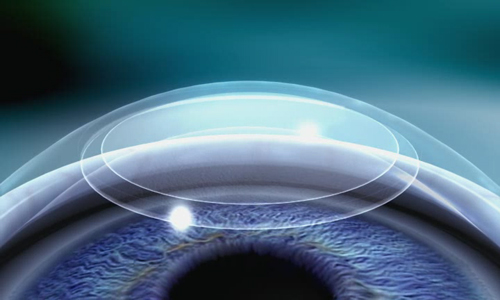Hey there! If you or someone you know is struggling with keratoconus, we’ve got your back. In today’s blog post, we’ll be diving into the ins and outs of corneal transplantation – a potential game-changer in treating this eye condition. Whether you’re considering this procedure for yourself or just curious about the topic, this article will give you a rundown of the five key things you need to know before making any decisions. From understanding the basics of keratoconus to exploring the benefits and potential risks of corneal transplantation, we’ll cover it all. So, grab a cup of coffee, take a seat, and let’s get started on this enlightening journey together!
What is Keratoconus?
Keratoconus is a progressive eye condition in which the cornea gradually becomes thin and irregularly shaped. This leads to visual impairments such as blurry or distorted vision. One potential treatment option for individuals with keratoconus is corneal transplantation. This surgical procedure involves replacing the damaged cornea with a healthy donor cornea, aiming to restore clear vision and improve overall eye health. Keratoconus corneal transplantation offers hope to those struggling with the impacts of this condition, promising better visual outcomes and enhanced quality of life. Through this procedure, individuals affected by keratoconus can regain their visual acuity and alleviate the challenges posed by this debilitating eye condition.
Keratoconus is a progressive eye condition that affects the shape of the cornea, leading to distorted vision. As the condition progresses, glasses and contact lenses, which are often the initial treatment options, may no longer be effective in correcting vision. This can be frustrating and challenging for individuals with keratoconus, as clear and sharp vision becomes more difficult to achieve. However, there is hope. In cases where vision correction methods fail, a corneal transplant may be necessary to improve and restore vision. This surgical procedure involves replacing the damaged cornea with a healthy one from a donor. While the idea of a transplant may seem daunting, advancements in medical technology have made corneal transplants more successful than ever before. The transplant not only addresses the issue of distorted vision but also provides an opportunity for patients to regain their quality of life and visual independence. It is important for those with keratoconus to consult with an eye specialist who specializes in corneal transplantation to determine if this procedure is the right course of action for them. With the help of skilled surgeons and a willingness to explore innovative treatment options, individuals with keratoconus can look forward to a brighter future with improved vision and enhanced overall well-being.
Keratoconus corneal transplantation is an exceptional intervention that offers immense hope for individuals suffering from advanced cases of keratoconus. This innovative procedure serves as the most effective method to restore vision by replacing the damaged cornea with a healthy one obtained from a generous donor. Through keratoconus corneal transplantation, the deteriorated cornea is replaced, granting a renewed lease on life for patients who have endured the limitations of their vision. This groundbreaking solution has revolutionized the field of ophthalmology, providing an opportunity for those affected by keratoconus to regain their sight and experience the world in all its splendor once again.
Thereafter, keratoconus corneal transplantation emerges as a highly effective and viable solution for individuals suffering from this progressive eye disease. With the ability to restore clear vision and halt the advancement of the condition, successful transplant surgeries offer hope and relief to those affected by keratoconus. By addressing the root cause and providing a permanent solution, this procedure not only improves the quality of life for patients but also eliminates the need for continued treatments or interventions. Amidst the challenges posed by keratoconus, corneal transplantation stands as a beacon of hope, offering a path towards a brighter and clearer future.
When Should I Consider Corneal Transplantation?
If your vision is seriously affected and causing considerable challenges in your day-to-day activities, it is worth contemplating a corneal transplantation as a potential solution for your keratoconus. Keratoconus is a condition in which the cornea becomes progressively thinner and bulges into a cone shape, leading to distorted vision. Despite the availability of corrective measures like glasses or contact lenses, sometimes the impairment can be so substantial that alternative interventions become necessary. Corneal transplantation entails replacing the damaged cornea with a healthy one from a donor. This procedure aims to restore visual acuity and alleviate the difficulties faced due to keratoconus. By considering this option, individuals enduring significant visual impairment may regain a better quality of life and overcome the hurdles posed by their condition.
If you are experiencing frequent changes in eyeglass prescription or contact lenses, sensitivity to light, and eye pain or irritation, it may be time to consider keratoconus corneal transplantation. This procedure is a potential solution for individuals with keratoconus, a progressive eye condition that causes the cornea to thin and bulge into a cone shape. These key signs could indicate that your keratoconus has reached a point where other treatment options are no longer effective, and a corneal transplant may be the best course of action. During the transplantation procedure, a healthy cornea from a donor is surgically implanted into the affected eye, improving vision and reducing discomfort. If you find yourself struggling with the symptoms of keratoconus, it is crucial to consult with an eye specialist who can provide a thorough evaluation and determine if keratoconus corneal transplantation is suitable for your specific situation.
Corneal transplantation plays a significant role in addressing the visual impairments associated with keratoconus, a condition characterized by an abnormal shape of the cornea. When individuals with keratoconus develop a corneal scar that hinders their vision or experience discomfort due to the irregular shape of their corneas, undergoing a corneal transplantation becomes a suitable option. This procedure ensures that the damaged cornea is replaced with a healthy one, alleviating the visual disturbances caused by keratoconus. Moreover, it provides a renewed sense of clarity and comfort to individuals struggling with this condition, enabling them to regain their quality of life and engage in daily activities with improved vision. Corneal transplantation proves to be an effective solution for those affected by keratoconus, enabling them to overcome the challenges posed by corneal scarring or an abnormal corneal shape, ultimately restoring their visual acuity and enhancing their overall well-being.
Also, when it comes to keratoconus corneal transplantation, it is essential to remember that the final decision lies in the hands of both the patient and their doctor. Engaging in a thorough and open discussion about the various potential benefits and risks of the procedure is imperative before making any definitive choices. By actively participating in this conversation, patients can gain a comprehensive understanding of how corneal transplantation may potentially provide relief from the debilitating effects of keratoconus. In weighing the benefits against the risks, patients can make an informed decision that aligns with their individual circumstances and goals. Ultimately, this collaborative approach between patient and doctor ensures that the path chosen leads to the most suitable treatment option for keratoconus corneal transplantation.
What Are the Risks of Corneal Transplantation for Keratoconus?
Corneal transplantation for keratoconus, known as keratoconus corneal transplantation, is an established procedure that offers a significant potential for improving visual acuity in individuals suffering from this condition. This surgical intervention is generally considered to be safe and effective, leading to remarkable improvements in vision. However, it is important to note that like any surgical procedure, there are inherent risks associated with keratoconus corneal transplantation. It is crucial to have an open and informed discussion with your doctor prior to undergoing the procedure in order to thoroughly understand these risks and make an informed decision about the course of treatment. By ensuring that you are fully aware of the potential complications and outcomes, you can work together with your doctor to determine if keratoconus corneal transplantation is the best option for you.
When considering keratoconus corneal transplantation, it is crucial to be aware of the potential risks involved. Specifically, there are several risks that patients should be informed about. The first risk is graft rejection, which occurs when the body’s immune system mistakenly attacks the newly transplanted cornea. This can lead to complications and jeopardize the success of the transplant. Another risk is vision loss, which can result from various complications such as infection or the cornea failing to heal properly after surgery. These complications can negatively impact visual acuity and impede the overall success of the procedure. Additionally, astigmatism may occur as a consequence of scar formation on the newly transplanted cornea, further affecting visual quality. It is essential to understand these potential risks before proceeding with keratoconus corneal transplantation, ensuring that patients can make informed decisions regarding their treatment options.
Finally, it is crucial to consider the potential complications associated with keratoconus corneal transplantation. Apart from the primary concern of graft rejection, other complications such as inflammation and elevated intraocular pressure can arise. If left untreated, these issues could progress to glaucoma, a severe condition that can result in irreversible vision loss. Therefore, it is essential for both patients and healthcare providers involved in keratoconus corneal transplantation to remain vigilant and closely monitor for any signs of inflammation or increased intraocular pressure. By promptly addressing these complications, the success rate of the procedure can be maximized, ultimately leading to improved visual outcomes and better quality of life for individuals suffering from keratoconus.
How Is the Procedure Performed?
A keratoconus corneal transplantation is a surgical procedure designed to treat keratoconus, a degenerative eye condition that causes the cornea to become thin and protrude in a cone-like shape. This procedure is usually conducted in an outpatient surgery clinic, ensuring convenience for the patient. The first step involves removing the diseased cornea, which is causing vision impairment and discomfort. Then, a healthy cornea donated by a generous individual is carefully implanted in its place. This donated cornea serves as a replacement, restoring clear vision and improving the patient’s quality of life. Thanks to this remarkable transplantation technique, individuals suffering from keratoconus have a chance to regain their visual acuity and live without the burdensome symptoms of this debilitating condition.
During a keratoconus corneal transplantation procedure, the surgeon skillfully carries out a meticulous process. The primary objective is to alleviate the visual impairment caused by keratoconus – a condition where the cornea becomes thin and cone-shaped, leading to distorted vision. To address this issue, the surgeon will initiate by making a precise circular incision in the center of the affected cornea. Through this incision, the damaged cornea is removed, making way for a donated cornea that will replace it. With utmost care and precision, the surgeon shapes and places the new cornea, aiming to restore clear and unimpaired vision for the patient. This delicate surgery necessitates expertise and attention to detail, ensuring the best possible outcome for individuals afflicted with keratoconus.
During a keratoconus corneal transplantation, once the donor cornea is placed onto the patient’s eye, the skilled surgeon meticulously uses sutures to firmly secure it in place. This critical step ensures that the transplanted cornea remains in its intended position and promotes successful integration. To guarantee precise alignment, the surgeon utilizes a special microscope that allows for enhanced visualization and meticulous evaluation. By employing this advanced tool, the surgical team can ensure that the donor cornea is accurately positioned to address the specific needs of the patient undergoing keratoconus corneal transplantation.
However, it is important to note that the use of antibiotics and anti-inflammatory medications is crucial in the postoperative period of keratoconus corneal transplantation. These medications are administered either intravenously or topically to effectively reduce inflammation and promote the healing process of the transplanted cornea. Antibiotics serve to prevent or treat any potential infections that may arise, safeguarding the integrity of the transplanted cornea. Additionally, anti-inflammatory medications play a vital role in minimizing the inflammatory response, which can impede the healing process. By addressing these key aspects, healthcare professionals can ensure a successful surgical outcome for individuals undergoing keratoconus corneal transplantation, providing them with improved vision and enhanced quality of life.
What Results Can I Expect After a Corneal Transplant for Keratoconus?
Keratoconus corneal transplantation is a remarkable procedure that offers significant improvement in vision for individuals suffering from this condition. By undergoing a corneal transplant for keratoconus, patients can expect a notable enhancement in their vision. Reports from most patients indicate achieving a vision of 20/40 or even better after the transplantation. This procedure holds great promise for those afflicted by keratoconus, providing them with renewed hope and an opportunity to regain clear sight.
Keratoconus corneal transplantation is a procedure that offers hope to individuals suffering from this progressive eye disorder. One of the main benefits of this surgery is the potential for improved vision. However, it is important to understand that achieving this improved vision may take some time. In fact, it is common for patients to experience optimal results up to a year after the surgery. This timeline is necessary as the cornea needs sufficient time to heal and settle into its new shape. Patience is key during the recovery process, as the newly transplanted cornea adjusts and begins to provide clearer vision.
Again, while keratoconus corneal transplantation has shown positive outcomes in terms of improved vision for the majority of cases, it is crucial to acknowledge the potential risks and complications associated with this procedure. Infection and rejection of the donor tissue are two significant concerns that patients must be aware of. To make an informed decision, it is essential for individuals considering a corneal transplant for keratoconus to have detailed discussions about these risks with their surgeon prior to undergoing the procedure. By being well-informed and understanding the potential challenges, patients can make a confident choice regarding keratoconus corneal transplantation, ensuring the best possible outcome for their vision and overall health.
Are There Alternatives to Corneal Transplantation for Keratoconus?
Corneal transplantation is a treatment option for individuals with keratoconus, an ocular condition characterized by the thinning of the cornea and impaired focusing ability. In some cases, keratoconus can even result in the loss of vision. To address these complications, keratoconus corneal transplantation is employed as a solution. This procedure involves replacing the damaged cornea with a healthy cornea from a donor. By doing so, the aim is to improve visual acuity and enhance the patient’s quality of life. Keratoconus corneal transplantation represents a vital treatment approach in managing this progressive condition, offering hope to those affected by its debilitating effects.
Corneal transplantation has long been regarded as the most successful therapeutic measure for managing keratoconus. Although it has proven to be effective, this procedure is not without its risks and potential complications. Among the potential drawbacks, the rejection of donated tissue stands out as a significant concern. However, with advancements in surgical techniques and the introduction of immunosuppressive medications, the success rate of corneal transplantation has substantially improved. Patients diagnosed with keratoconus should be aware of the potential risks and complications associated with this procedure, but they can also take solace in the fact that medical advancements have significantly reduced these risks over time.
When it comes to the treatment of keratoconus, a progressive condition that causes the cornea to become thin and cone-shaped, there are viable alternatives to corneal transplantation. One such alternative is the use of intracorneal ring segments (ICRS), which have been proven effective in reducing the severity of symptoms. These small implants help reshape the cornea, ultimately improving vision in individuals with mild to moderate cases of keratoconus. This non-invasive procedure provides hope for those seeking relief from the debilitating effects of this condition, offering a potential solution that avoids the need for a more invasive and complex corneal transplantation surgery. By highlighting the use of ICSRs, patients can explore an alternative treatment option that strives to restore visual acuity and minimize the impact of keratoconus without the need for a full corneal transplant.
Moreover, in addition to keratoconus corneal transplantation, there are other treatment options available for individuals suffering from this condition. Collagen crosslinking is a technique that employs UV light and vitamin B2 drops to reinforce the cornea and prevent further deterioration. This treatment aims to halt the progression of keratoconus and stabilize the cornea. Another option is laser surgery, which can help reshape the cornea and improve visual acuity. Additionally, hybrid lenses, which combine both glasses and contact lenses, offer an alternative for those who may not be suitable candidates for surgery. These lenses utilize a combination of hard and soft materials to provide a comfortable and effective visual correction. Overall, while keratoconus corneal transplantation is a viable option for some patients, these alternative treatments can offer relief and improved vision for individuals with this condition.
How Will My Recovery Be After a Corneal Transplant?
After undergoing a keratoconus corneal transplantation, patients are typically required to undergo a recovery period lasting approximately six weeks. During this crucial phase, individuals are advised to avoid any strenuous physical activities, including contact sports. This cautionary measure is implemented to ensure the success of the corneal transplant procedure and allow for proper healing and recovery. Engaging in activities that involve significant physical exertion may put undue strain on the newly transplanted cornea, potentially leading to complications and compromising the overall outcome. Therefore, it is essential for patients to adhere to the medical advice provided and prioritize a period of rest and careful rehabilitation. This dedicated recovery time is crucial in allowing the keratoconus corneal transplantation to settle and for patients to regain optimal visual acuity and corneal function.
If you’ve undergone a keratoconus corneal transplantation, it’s crucial to adhere to a consistent post-operative care routine. Regular checkups with your doctor will be necessary to monitor your progress and ensure a successful recovery. Additionally, specialized eyedrops will likely be prescribed for you to use for several weeks or even months following the transplant. These drops play a crucial role in promoting healing and preventing any potential complications from arising. Therefore, it is imperative that you strictly follow your doctor’s instructions regarding the usage and frequency of these medications. By doing so, you are actively contributing to your long-term recovery and maximizing the chances of achieving optimal visual outcomes. Remember, your doctor is the expert in guiding you through this process and ensuring the best possible results, so trust their expertise and guidance.
When undergoing a keratoconus corneal transplantation, it is important to follow certain guidelines to ensure a successful recovery. Along with post-operative care, you may also be asked to limit certain activities that could put pressure on the eyes, such as reading or engaging in close-up work with digital devices. These activities can strain the eyes and potentially compromise the healing process. By refraining from these tasks, you are giving your eyes the necessary rest and allowing them to heal properly. Following these instructions will contribute to a positive outcome and improve your chances of a successful keratoconus corneal transplantation.
Additionally, it is crucial for patients who have undergone a keratoconus corneal transplantation to remain diligent and attentive during the initial weeks post-surgery. Being aware of the potential risks of rejection and infection, individuals should actively monitor any alterations in their vision or discomfort in the affected eyes. Given the importance of timely intervention, promptly reporting any new symptoms to the doctor enables them to provide swift and appropriate care if necessary. By maintaining a vigilant approach, patients can contribute to the success and long-term viability of their corneal transplant, ultimately leading to improved vision and a better quality of life.
Who Performs Corneal Transplants for Keratoconus?
Keratoconus corneal transplantation, a procedure commonly executed by skilled ophthalmologists or cornea specialists, is fundamental in addressing the eye condition known as keratoconus. These medical professionals possess a profound understanding of diagnosing and treating various eye conditions, specifically keratoconus. With their expertise, they are able to perform corneal transplants, a crucial intervention for patients suffering from keratoconus. Through this procedure, individuals experiencing thinning and bulging of the cornea can find solace in the expertise of these specialists, who strive to restore their vision and alleviate the burdensome symptoms associated with keratoconus. Their dedication and proficiency epitomize their commitment to ensuring that patients receive the highest quality care and regain their visual health.
When considering a keratoconus corneal transplantation, the success rate of the procedure is influenced by various factors. Thus, it is crucial to seek guidance from a seasoned professional who possesses extensive experience in performing such a complex surgery. A corneal transplant, although promising, requires careful evaluation of the patient’s condition, including the severity of keratoconus and any potential complications. By consulting with an experienced specialist, patients can obtain valuable insights into their unique case and receive personalized treatment options that offer the highest chances of success. It is also essential to consider factors such as the surgeon’s expertise, the type of cornea used for transplantation, and post-operative care. A qualified professional will be able to provide comprehensive information and support throughout the process, ensuring optimal outcomes for patients with keratoconus in need of corneal transplantation.
Thereafter, finding a highly-trained cornea specialist becomes crucial in ensuring the best possible outcomes for patients in need of keratoconus corneal transplantation. As each patient’s condition is unique, the specific type of transplant required may vary. By seeking out a specialist who has extensive experience and expertise in this field, patients can have confidence in the personalized care and attention they will receive. This kind of specialized care ensures that the transplantation procedure is tailored to address the patient’s specific needs, leading to optimal results. With the expertise and guidance of a cornea specialist, patients can embrace the hope and potential that keratoconus corneal transplantation offers, regaining clear vision and a renewed quality of life.
How Can I Find the Best Care for Corneal Transplants for Keratoconus?
When faced with the need for a corneal transplant due to keratoconus, finding the best care is crucial. The first step is to conduct thorough research on surgeons who specialize in this specific procedure. It is wise to inquire and seek recommendations from individuals who have undergone similar keratoconus corneal transplantations in the past. By doing so, one can gain valuable insights and potentially identify top-notch healthcare providers experienced in this specific field. Making an informed decision when it comes to such a delicate procedure like keratoconus corneal transplantation is of utmost importance to ensure the best possible outcome for patients seeking relief from this condition.
When considering keratoconus corneal transplantation, it is crucial to find a surgeon with a proven track record of successful outcomes in this specific procedure. It is advisable to prioritize surgeons who have demonstrated expertise in keratoconus corneal transplants to ensure optimal results. Inquiring about a surgeon’s level of experience and credentials will help determine their qualifications to perform this intricate surgery. By selecting a surgeon with extensive experience and a reputable background in keratoconus corneal transplantation, patients can increase the likelihood of a successful and satisfactory outcome.
When considering a keratoconus corneal transplantation, it is essential to approach the decision with the utmost care and research. To ensure the best possible outcome, it is highly recommended to check the reviews and ratings of potential surgeons online. By doing so, one can gather valuable insights from past patients who have undergone similar procedures, allowing for an informed choice in selecting the most appropriate doctor. Taking into account the experiences of others and evaluating the quality of care provided will enable individuals to make a well-informed decision, ultimately contributing to a successful keratoconus corneal transplantation procedure.
Next, when considering a keratoconus corneal transplant, it becomes evident that choosing the right surgeon is crucial for ensuring the success of the procedure and safeguarding your long-term health and well-being. This decision should not be taken lightly, as it represents a significant investment in your overall quality of life. By thoroughly exploring and comparing all available options, and engaging in conversations with multiple surgeons, you can gain valuable insights to make an informed decision about the individual who best aligns with your specific needs. Remember to prioritize traits such as experience, expertise, and a good rapport, as these factors contribute to a positive surgical outcome. By taking the time to make an educated choice, you can embark on your corneal transplant journey with confidence, knowing that you have chosen a skilled and trustworthy surgeon who will guide you towards a brighter future.
Read also: Visionace Healthy Eyes Good Vision
In conclusion, if you or a loved one is facing the possibility of corneal transplantation for keratoconus, it’s important to arm yourself with the knowledge and understanding of this procedure. By knowing the basics of keratoconus, exploring the benefits and potential risks of corneal transplantation, and considering alternative treatment options, you can make an informed decision that aligns with your specific situation. Remember, you don’t have to navigate this journey alone – we’re here to support and provide you with the information you need. So, take a deep breath, trust your instincts, and remember that no matter what path you choose, we’ve got your back.







